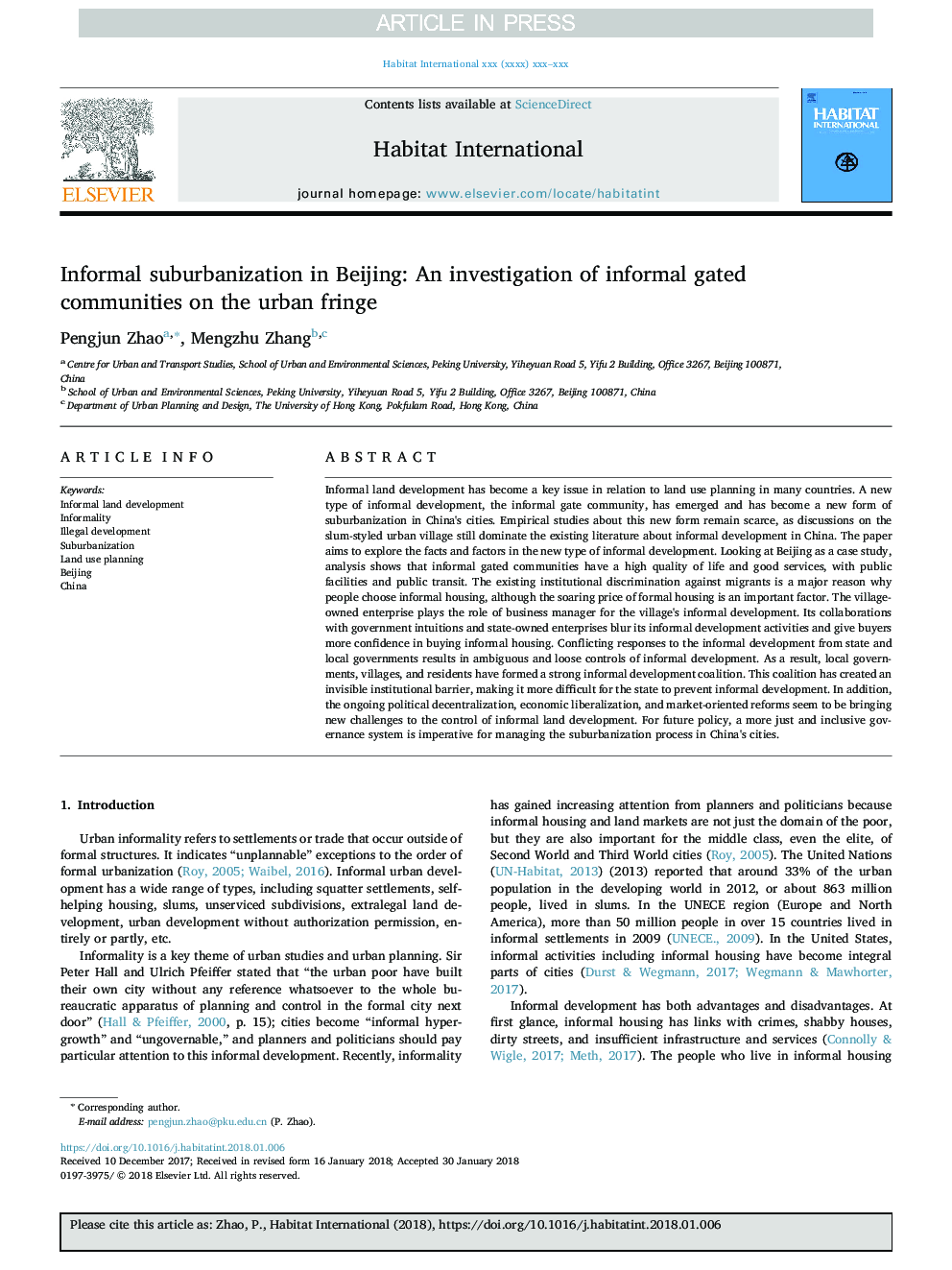| کد مقاله | کد نشریه | سال انتشار | مقاله انگلیسی | نسخه تمام متن |
|---|---|---|---|---|
| 7455007 | 1484467 | 2018 | 13 صفحه PDF | دانلود رایگان |
عنوان انگلیسی مقاله ISI
Informal suburbanization in Beijing: An investigation of informal gated communities on the urban fringe
ترجمه فارسی عنوان
حومه غیر رسمی در پکن: تحقیق درباره جوامع غیر رسمی در حاشیه شهری
دانلود مقاله + سفارش ترجمه
دانلود مقاله ISI انگلیسی
رایگان برای ایرانیان
کلمات کلیدی
توسعه غیر رسمی زمین، غیر رسمی، توسعه غیرقانونی، حومه شهر، برنامه ریزی استفاده از زمین، پکن، چین،
ترجمه چکیده
توسعه غیر رسمی زمین به یک موضوع کلیدی در ارتباط با برنامه ریزی استفاده از زمین در بسیاری از کشورها تبدیل شده است. نوع جدیدی از توسعه غیر رسمی، جامعه دروازه های غیر رسمی، پدید آمده است و به شکل جدیدی از حومه شهرها در شهرهای چین تبدیل شده است. مطالعات تجربی در مورد این فرم جدید هنوز کم است، زیرا بحث در مورد روستای شهری روستایی فقیرنشین همچنان بر ادبیات موجود در مورد توسعه غیر رسمی در چین غالب است. هدف مقاله بررسی عوامل و حقایق در نوع جدیدی از توسعه غیر رسمی است. تجزیه و تحلیل نشان می دهد که جوامع غیر رسمی دارای کیفیت بالایی در زندگی و خدمات خوب، با امکانات عمومی و حمل و نقل عمومی هستند. تبعیض سازمانی موجود در برابر مهاجران دلیل عمده ای است که مردم مسکن غیر رسمی را انتخاب می کنند، گرچه افزایش قیمت مسکن رسمی عامل مهمی است. این شرکت دارای روستائی است که نقش مدیر تجاری را برای توسعه غیر رسمی روستا ایفا می کند. همکاری های آن با شهود دولت و شرکت های دولتی، فعالیت های غیررسمی آن را تضعیف می کند و به خرید خریداران اعتماد بیشتری به خرید مسکن غیر رسمی می دهد. واکنش های متقابل به توسعه غیر رسمی از دولت های دولتی و محلی منجر به کنترل مبهم و آزادانه توسعه غیر رسمی می شود. در نتیجه، دولت های محلی، روستاها، و ساکنان یک ائتلاف قوی و غیر رسمی ایجاد کرده اند. این ائتلاف یک مانع سازمانی نامرئی ایجاد کرده است، و دولت برای جلوگیری از توسعه غیر رسمی مشکل می کند. علاوه بر این، تمرکززدایی سیاسی مداوم، آزادسازی اقتصادی و اصلاحات بازار گرا به نظر میرسد که چالشهای جدیدی برای کنترل توسعه غیر رسمی زمین باشد. برای سیاست های آینده، یک سیستم حکومتی مستحکم تر و جامع تر برای مدیریت فرایند حومه سازی در شهر های چین ضروری است.
موضوعات مرتبط
علوم انسانی و اجتماعی
علوم اجتماعی
توسعه
چکیده انگلیسی
Informal land development has become a key issue in relation to land use planning in many countries. A new type of informal development, the informal gate community, has emerged and has become a new form of suburbanization in China's cities. Empirical studies about this new form remain scarce, as discussions on the slum-styled urban village still dominate the existing literature about informal development in China. The paper aims to explore the facts and factors in the new type of informal development. Looking at Beijing as a case study, analysis shows that informal gated communities have a high quality of life and good services, with public facilities and public transit. The existing institutional discrimination against migrants is a major reason why people choose informal housing, although the soaring price of formal housing is an important factor. The village-owned enterprise plays the role of business manager for the village's informal development. Its collaborations with government intuitions and state-owned enterprises blur its informal development activities and give buyers more confidence in buying informal housing. Conflicting responses to the informal development from state and local governments results in ambiguous and loose controls of informal development. As a result, local governments, villages, and residents have formed a strong informal development coalition. This coalition has created an invisible institutional barrier, making it more difficult for the state to prevent informal development. In addition, the ongoing political decentralization, economic liberalization, and market-oriented reforms seem to be bringing new challenges to the control of informal land development. For future policy, a more just and inclusive governance system is imperative for managing the suburbanization process in China's cities.
ناشر
Database: Elsevier - ScienceDirect (ساینس دایرکت)
Journal: Habitat International - Volume 77, July 2018, Pages 130-142
Journal: Habitat International - Volume 77, July 2018, Pages 130-142
نویسندگان
Pengjun Zhao, Mengzhu Zhang,
